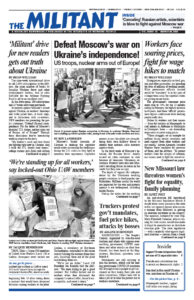WASHINGTON — The People’s Convoy, organized by over-the-road truckers and others who oppose overreaching government COVID mandates and other attacks on their livelihoods, has been based at the Hagerstown, Maryland, speedway since March 6.
Participants are still arriving to join the protests, which call for ending government COVID-19 mandates that attempt to force people to get vaccinated or face losing their jobs and other restrictions. Others have left to take a job or to take the protest out to workers elsewhere.
On March 14 and 15 hundreds of truckers, along with their supporters, brought their protest part way into the District of Columbia here to draw attention to their demands. But they were prevented from getting to the center of the city by police barricades. When truckers tried to drive from Interstate 295 to 695 toward downtown, they found their route blocked by a dump truck and police. They were forced back on the interstate and after making a loop around the city on the beltway returned to Hagerstown.
Convoy organizer Brian Brase told the press that the cops’ roadblocks are a violation of their First Amendment right to protest, and that their forced redirection of travel had caused traffic jams that inconvenienced regular people. “We’re not going anywhere,” he said.
The government mandates, which interfered with many truckers’ ability to work, were the last straw in an ongoing series of attacks imposed by Washington and trucking bosses that have threatened their livelihoods.
Since the federal government deregulated the trucking industry in 1980 under the Jimmy Carter administration, nonunion bosses have moved in and wreaked havoc on workers in an industry that had been largely organized by the Teamsters union. Cutthroat competition drove down wages, forcing drivers to greatly increase the time spent on the road trying to eke out a living. They’re paid by the mile, so time spent idling at warehouses waiting to be loaded or unloaded yields no income. The changes in the industry led to 91% of truckers quitting their jobs in 2019.
Truckers also face outrageously rigorous surveillance every moment they’re in the cab. They’re monitored by a bevy of cameras and sensors. Many bosses have installed software programs to detect whether a driver keeps his eyes on the road. You can be fired for glancing at your phone.
“Trucking has been a keg of dynamite waiting to explode for 39 years,” Jerry Fritts, a retired long-haul trucker from Memphis, Tennessee, told the New York Times. “I’m surprised it took this long.”
Ignoring these onerous conditions that fueled the protest, the liberal media here, like in the case of the truckers’ convoy in Canada last month, has smeared the protesters as reactionary, conspiracy-driven and dangerous people.
‘We’ll keep coming back’
Truckers demand relief from low freight rates brokers impose to boost their profits, government regulations and red tape, and soaring diesel prices, which accelerate the debt crisis facing many truckers. “We are being starved to death,” owner-operator Harry Menkhoff, part of a convoy from Salina, Kansas, told the Militant by phone. “If fuel stays up and the brokers keep dropping our rates, we will be hauling freight for free.” Menkhoff said it costs him at least $1,500 to fuel his rig. “At the truck stop I’m at, it’s $5.89 a gallon.”
Diesel prices have increased for 10 weeks in a row, jumping 74.5 cents last week alone. “Going green is hurting working people,” said Menkhoff, referring to U.S. government energy policies. President Joseph Biden says that to address the “existential” threat of climate change his administration is cutting new oil and gas drilling.
“Our convoy has been stopping at truck stops on our way home, setting up information tables, handing out food that was donated to our convoy, talking to everyone who stops to listen,” said Chelly Bartow Menkhoff, a leader of United States Dedicated Drivers. “It’s not just truckers. There’s a war against working people. The government tries to keep us divided.” She renewed her subscription to the Militant, which had run out, saying, “I need to have it back.”
“I liked being part of a movement,” Jason Jackson, a car delivery driver from Evergreen, Colorado, told this worker-correspondent. “A lot of people are on the same sheet of music, and we don’t even know it.”
Jackson, out of work for almost two years as a result of the impact of the semiconductor chip shortage in the auto industry, joined the Kansas convoy and was part of the truck stop tabling effort. “Truckers are meeting each other, talking about what we face. We are learning how to defend our rights. We will keep coming back to Washington until we find a solution.”

